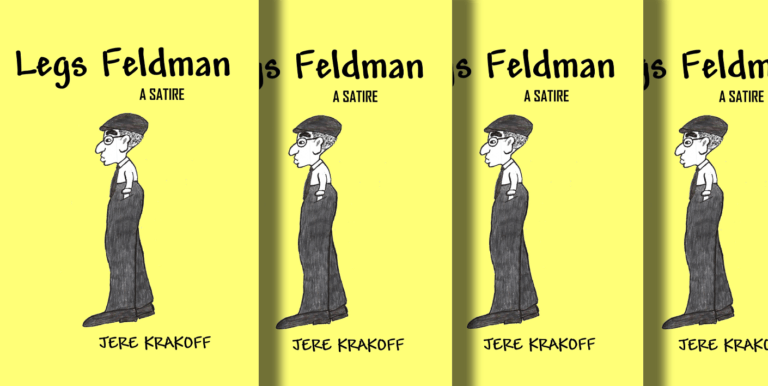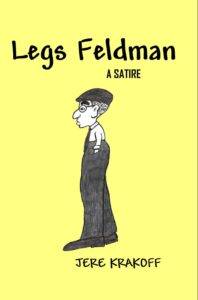From the Publisher: “The humorous satire centers around the misfortunes of Zelman Feldman, born with oversized legs and a passion for dance. In this eccentric social satire, set in the early twentieth century in a fictious Republic, Zelman Feldman is born with immense legs. To share this extraordinary discovery with the Republic’s scientific community, his pediatrician convenes a symposium soon after Zelman’s delivery. Zoologists and other scientific luminaries are mesmerized by the size of the limbs.
Front page articles about the ‘Feldman Phenomenon’ appear in newspapers of every political stripe.
Thus begins Zelman’s comical journey as a person whom society views as an oddity. Among the colorful characters he encounters over the years are unscrupulous distant relatives, a shady freak show barker, a sensuous former prima ballerina, and a womanizing business mogul. The odyssey climaxes in a bizarre trial that will decide his future. What will the verdict be? More important, can he find happiness despite his physical anomaly? This witty novel about society’s prejudices and other flaws answers these questions and offers insights into the imperfect human condition.”
More info About the Author: Prior to writing humorous satirical novels, Jere Krakoff was a civil rights attorney. He practiced with the ACLU National Prison Project in Washington, D.C., the Lawyers Committee for Civil Rights Under Law in Mississippi, the Pennsylvania Institutional Law Project headquartered in Philadelphia, and Neighborhood Legal Services Association, a legal aid program in Pittsburgh.
His first book, Something Is Rotten in Fettig (Anaphora), lampoons the criminal justice system of a fictitious Republic.
His second, The Chameleon Shuffle (Open Books), casts a critical eye on the same Republic’s High Court.
His third, Legs Feldman (All Things That Matter Press), climaxes in a zany trial of the novel’s protagonist.
All three novels were inspired by people, places, and events he observed while litigating and a lifetime of witnessing some of the best and worst of the human condition.
Author Site
Zelman’s circumcision was held at the Tree of Temptation, the modest synagogue in Fettig’s Small Business District where his parents were married. The couple retained Shmuel Greenspan, a correspondence-school mohel, to keep the covenant. Greenspan had been highly recommended by the Tree of Temptation’s part-time rabbi as well as Greenspan’s second cousin-by marriage, a self-described Talmudic scholar who claimed to be steeped in circumcision protocol.
Greenspan was profoundly neurotic, with no tolerance for uncooperative infants and prone to erratic behavior if a bris did not go smoothly. According to the National Association of Mohels, he was temperamentally unfit for this sensitive work and was giving the profession a bad name. Despite the negatives, he was among Fettig’s most prolific mohels, with countless cuttings under his belt.
In addition to being neurotic and temperamentally unfit, Shmuel Greenspan suffered from delusions of grandeur. He comported himself as a physician, donning a surgical gown and gloves, and carried a leather medical bag filled with an array of knives, saws, and other cutting instruments that had no place in circumcisions.
After a round of celebratory prayers by Tree of Temptation congregants, the part-time rabbi gestured to Greenspan to proceed. As Zelman cooed on his father’s lap at the base of the dais, Greenspan rooted through his bag and removed dozens of instruments he had no intention of using. Congregants were, by turns, impressed and horrified.
Several minutes later, the mohel located the scalpel he needed to remove the infant’s foreskin and render him an official Jew. Utilizing a leather barber strap, Greenspan stroked the scalpel until satisfied it was sharp enough to do the deed. The congregants looked on in rapt attention, except Zelman’s parents, who dreaded what was about to occur and turned away.
Greenspan approached, wielding the scalpel, eyes bulging, grinning maniacally. Eyeing his prey, the pseudo-surgeon came within inches of Zelman’s coiled legs. The infant’s legs suddenly uncoiled, striking Greenspan in his midsection and sending him sprawling onto the floor.
Gasping, Greenspan eventually managed to lift himself as the congregants looked on. His face was beet red. His mouth ached. His jowls throbbed. He shouted, “I’ll get you, you little punk!”
Greenspan charged the child like a bull. The part-time rabbi, an avowed pacifist, tackled him, sending both the mohel and the scalpel to the floor, but in different directions. The Tree of Temptation’s cantor leapt onto the part-time rabbi and Greenspan. The synagogue’s recording secretary then leapt onto the cantor, part-time rabbi, and Greenspan.
Elderly synagogue regulars left the pews to join the scrum. Greenspan’s wife, who often attended his circumcisions, ran toward them, threatening to sue the part-time rabbi, cantor, recording secretary, and anyone else on top of her husband if they didn’t let him up. Fearing litigation, the part-time rabbi instructed his followers to stand down.
“Not yet!” a man shouted from the pews. “Don’t move until I tell you!”
The shouter was a defense attorney.
“Why?” asked the rabbi, gasping for air under the pile.
“Have Greenspan sign a waiver before you let him up!” the defense attorney said in a lawyerly tone. “I have one in my suit jacket.” He always had a waiver on him in case of a legal emergency.
“Will you sign?” the part-time rabbi asked Greenspan, who could barely breathe.
“Only if I can consult a lawyer and get the green light,” Greenspan croaked.
“Is there a plaintiff’s lawyer in the shul?” asked the part-time rabbi.
“Here,” came a muffled voice from deep under the pile.
“What kind?” asked Greenspan.
“Personal injury,” the lawyer answered.
“So, should I sign?” Greenspan asked.
“If you have no permanent or life-threatening injuries, go ahead,” said the voice.
“Don’t sign anything until I check his credentials,” said Greenspan’s wife.
An arm protruded from the writhing mass. It was holding a Bar card. After a brief inspection, Greenspan’s wife told her husband to sign. Moments later, the defense attorney removed a waiver form from his suit jacket, approached the pile, and asked the person on top to pass it and a pen down to Greenspan. When the waiver reached the mohel, he squinted at the fine print, then capitulated. The pile disassembled. Greenspan stood. And his wife announced that he would not be performing the circumcision.
Jewish tradition called for circumcisions to be performed eight days after birth. Out of an abundance of religious caution, the Feldmans didn’t want to postpone the event and asked the part-time rabbi if he could refer them to another mohel. The rabbi immediately thought of Leopold Plotkin, a financially struggling kosher butcher reputed to be the most skilled meat cutter in the city. Though the butcher had never performed a circumcision, the rabbi was confident that his butchering skills were transferable.
The rabbi dispatched the synagogue’s cantor, a former long-distance runner, to retrieve Plotkin from his one-room flat above the butcher shop. Perpetually teetering on the edge of bankruptcy, Plotkin was eager to earn the circumcision fee and jogged with the cantor back to the Tree of Temptation. Quick on his feet, the butcher approached with a sanitized knife, gracefully avoided Zelman’s flailing legs, and performed the operation without a glitch.
After a round of sweet sacramental wine, the celebrants wished the Feldmans well and headed for home.
This excerpt was published here courtesy of the author and should not be reprinted without permission.


























